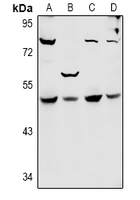Anti-SYT11 Antibody
Rabbit polyclonal antibody to SYT11
- SPECIFICATION
- CITATIONS
- PROTOCOLS
- BACKGROUND

Application
| WB |
|---|---|
| Primary Accession | Q9BT88 |
| Other Accession | Q9R0N3 |
| Reactivity | Human, Mouse, Rat |
| Host | Rabbit |
| Clonality | Polyclonal |
| Calculated MW | 48297 Da |
| Gene ID | 23208 |
|---|---|
| Other Names | KIAA0080; Synaptotagmin-11; Synaptotagmin XI; SytXI |
| Target/Specificity | Recognizes endogenous levels of SYT11 protein. |
| Dilution | WB~~WB (1/500 - 1/1000) |
| Format | Liquid in 0.42% Potassium phosphate, 0.87% Sodium chloride, pH 7.3, 30% glycerol, and 0.09% (W/V) sodium azide. |
| Storage | Store at -20 °C.Stable for 12 months from date of receipt |
| Name | SYT11 (HGNC:19239) |
|---|---|
| Synonyms | KIAA0080 |
| Function | Synaptotagmin family member involved in vesicular and membrane trafficking which does not bind Ca(2+). Inhibits clathrin- mediated and bulk endocytosis, functions to ensure precision in vesicle retrieval. Plays an important role in dopamine transmission by regulating endocytosis and the vesicle-recycling process. Essential component of a neuronal vesicular trafficking pathway that differs from the synaptic vesicle trafficking pathway but is crucial for development and synaptic plasticity. In macrophages and microglia, inhibits the conventional cytokine secretion, of at least IL6 and TNF, and phagocytosis. In astrocytes, regulates lysosome exocytosis, mechanism required for the repair of injured astrocyte cell membrane (By similarity). Required for the ATP13A2-mediated regulation of the autophagy-lysosome pathway (PubMed:27278822). |
| Cellular Location | Cytoplasmic vesicle membrane; Single-pass membrane protein. Perikaryon {ECO:0000250|UniProtKB:Q9R0N3}. Golgi apparatus, trans-Golgi network membrane {ECO:0000250|UniProtKB:Q9R0N3}; Single-pass membrane protein {ECO:0000250|UniProtKB:Q9R0N3}. Recycling endosome membrane {ECO:0000250|UniProtKB:Q9R0N3}; Single-pass membrane protein {ECO:0000250|UniProtKB:Q9R0N3}. Lysosome membrane {ECO:0000250|UniProtKB:Q9R0N3}; Single-pass membrane protein {ECO:0000250|UniProtKB:Q9R0N3}. Cytoplasmic vesicle, phagosome {ECO:0000250|UniProtKB:Q9R0N3}. Cell projection, axon. Cell projection, dendrite. Postsynaptic density {ECO:0000250|UniProtKB:Q9R0N3}. Recycling endosome membrane {ECO:0000250|UniProtKB:O08835}; Single-pass membrane protein {ECO:0000250|UniProtKB:O08835}. Cytoplasmic vesicle, clathrin-coated vesicle membrane {ECO:0000250|UniProtKB:O08835}; Single-pass membrane protein {ECO:0000250|UniProtKB:O08835}. Perikaryon. Note=Localized in vesicles that travels in axonal and dendritic shafts in both anterograde and retrograde directions. In macrophages and microglia, recruited in phagosomes at early stages of phagocytosis (By similarity). Found in the core of the Lewy bodies in the brain of sporadic Parkinson disease patients (PubMed:12925569). {ECO:0000250|UniProtKB:Q9R0N3, ECO:0000269|PubMed:12925569} |

Thousands of laboratories across the world have published research that depended on the performance of antibodies from Abcepta to advance their research. Check out links to articles that cite our products in major peer-reviewed journals, organized by research category.
info@abcepta.com, and receive a free "I Love Antibodies" mug.
Provided below are standard protocols that you may find useful for product applications.
Background
KLH-conjugated synthetic peptide encompassing a sequence within the center region of human SYT11. The exact sequence is proprietary.
If you have used an Abcepta product and would like to share how it has performed, please click on the "Submit Review" button and provide the requested information. Our staff will examine and post your review and contact you if needed.
If you have any additional inquiries please email technical services at tech@abcepta.com.













 Foundational characteristics of cancer include proliferation, angiogenesis, migration, evasion of apoptosis, and cellular immortality. Find key markers for these cellular processes and antibodies to detect them.
Foundational characteristics of cancer include proliferation, angiogenesis, migration, evasion of apoptosis, and cellular immortality. Find key markers for these cellular processes and antibodies to detect them. The SUMOplot™ Analysis Program predicts and scores sumoylation sites in your protein. SUMOylation is a post-translational modification involved in various cellular processes, such as nuclear-cytosolic transport, transcriptional regulation, apoptosis, protein stability, response to stress, and progression through the cell cycle.
The SUMOplot™ Analysis Program predicts and scores sumoylation sites in your protein. SUMOylation is a post-translational modification involved in various cellular processes, such as nuclear-cytosolic transport, transcriptional regulation, apoptosis, protein stability, response to stress, and progression through the cell cycle. The Autophagy Receptor Motif Plotter predicts and scores autophagy receptor binding sites in your protein. Identifying proteins connected to this pathway is critical to understanding the role of autophagy in physiological as well as pathological processes such as development, differentiation, neurodegenerative diseases, stress, infection, and cancer.
The Autophagy Receptor Motif Plotter predicts and scores autophagy receptor binding sites in your protein. Identifying proteins connected to this pathway is critical to understanding the role of autophagy in physiological as well as pathological processes such as development, differentiation, neurodegenerative diseases, stress, infection, and cancer.


